You can often hear a common phrase that the inhabitants of the post-Soviet space in Western countries cannot be confused with local residents. This applies equally not only to Russians, but also to Ukrainians, Belarusians and other citizens of the republics of the former Soviet Union. And the point here is not only in behavior and mentality, but also in appearance, manner of dressing.
Europeans' attitude to clothing
 In Western countries, a free style of wearing clothes has been practiced for decades.. By “West” here we should understand, first of all, Western Europe and the USA, which are very closely related to each other in an ethnocultural sense. The main difference between Europeans and Russians, as stylists and designers note, is in a simpler relation to everyday clothing. For example, European women, like our compatriots, will not spend half an hour choosing what to wear before going to the grocery store, and then spend the same amount of time applying makeup in front of the mirror.
In Western countries, a free style of wearing clothes has been practiced for decades.. By “West” here we should understand, first of all, Western Europe and the USA, which are very closely related to each other in an ethnocultural sense. The main difference between Europeans and Russians, as stylists and designers note, is in a simpler relation to everyday clothing. For example, European women, like our compatriots, will not spend half an hour choosing what to wear before going to the grocery store, and then spend the same amount of time applying makeup in front of the mirror.
For a native Western European who grew up somewhere in Germany, Great Britain or Holland, the first place is the practicality and convenience of the thing he wears. He can easily go to university, to the cinema, or on a date in shorts and an elongated sweater. Moreover, this applies not only to “common people” - in European capitals you can often find people of aristocratic blood walking freely along the street in faded jeans and sneakers. The same applies to family members of local oligarchs and high-ranking officials.
Typical attire for a European resident of average, by local standards, income and middle age, in the 2010s:
- Man. Jeans or trousers of a simple cut, in winter - a padded or leather jacket, as an option - a short coat. In spring and autumn, a jacket with jeans is most often worn; in the summer heat, a European can easily go to town in shorts and a loose T-shirt. Sneakers are most often seen on feet, with simple classic shoes in second place in popularity.
- Woman. A mid-length puffy jacket or coat, skinny jeans or leggings. On your feet in cool weather are sneakers or boots with a low platform, in the summer - shoes without heels or ordinary woven sandals, or even rubber slippers. Younger European women can wear thick tights with a pattern or bright leg warmers.
As for the color scheme, preference is given to not too flashy colors: gray, brown, black. Some accessories can be bright - straps, belts, scarves, berets. In general, the appearance of the average German or Englishman is completely unpretentious, to say the least - inexpressive. But this does not mean that the clothes they wear are cheap.Often these are quite well-known and expensive brands: for example, denim products are often Versace Jeans, Calvin Klein, Armani Jeans.
Why do they choose to dress soberly?
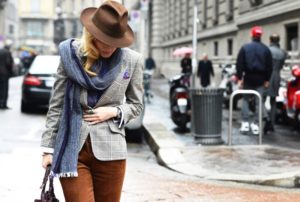 There are several reasons behind this restraint in clothing. Firstly, Standing out loudly from the crowd has not been customary in the West for several decades now, ever since the various youth cultural revolutions died down. After all, once upon a time, on the streets of European cities, one could everywhere meet brightly colored punks with “Mohawks” on their heads, fans of hard rock hung with metal, or the same long-haired “flower children” with a dreamy-romantic smile.
There are several reasons behind this restraint in clothing. Firstly, Standing out loudly from the crowd has not been customary in the West for several decades now, ever since the various youth cultural revolutions died down. After all, once upon a time, on the streets of European cities, one could everywhere meet brightly colored punks with “Mohawks” on their heads, fans of hard rock hung with metal, or the same long-haired “flower children” with a dreamy-romantic smile.
 Modern Westerners, even young people, in choosing clothes they often give preference to their own comfort rather than the desire to stand out and amaze everyone with their appearance. Moreover, flashy clothes today are perceived here as bad manners, kitsch, and lack of taste. In extreme cases - as an anachronism that came from the already distant 70-80s. At the same time, in the West it is not customary to publicly discuss the appearance of others. This, as they say in America, is their “privacy,” or, to put it in Russian, their personal business. This the principle of non-interference in the private life of a neighbor is a fundamental rule of European society.
Modern Westerners, even young people, in choosing clothes they often give preference to their own comfort rather than the desire to stand out and amaze everyone with their appearance. Moreover, flashy clothes today are perceived here as bad manners, kitsch, and lack of taste. In extreme cases - as an anachronism that came from the already distant 70-80s. At the same time, in the West it is not customary to publicly discuss the appearance of others. This, as they say in America, is their “privacy,” or, to put it in Russian, their personal business. This the principle of non-interference in the private life of a neighbor is a fundamental rule of European society.
And indeed, it is impossible not to recognize the undoubted advantages of a simple attitude to everyday clothing. Many women will agree that it is much more pleasant and convenient to rush about their business in light shoes with a flat wedge than in heels 5–10 cm high. And men admit that it is much more comfortable to sit behind the wheel of a car in the summer heat in a loose T-shirt and Bermuda shorts than in a suit jacket and tie. But, as the ancients said, suum cuique.
Greed or practicality?
 Some of our compatriots, who are prejudiced against the inhabitants of the Western world, tend to see in such unpretentiousness in the choice of everyday clothing the notorious stinginess of Europeans. Is this really greed, or is it more appropriate to talk about practicality here? It seems that the choice of simple, inexpressive attire has little to do with greed.
Some of our compatriots, who are prejudiced against the inhabitants of the Western world, tend to see in such unpretentiousness in the choice of everyday clothing the notorious stinginess of Europeans. Is this really greed, or is it more appropriate to talk about practicality here? It seems that the choice of simple, inexpressive attire has little to do with greed.
Firstly, as noted above, the most modest, at first glance, European clothes can actually cost hundreds of euros. Secondly, residents of Western European countries are not at all devoid of concepts about good taste and the appropriateness of wearing a certain type of clothing in a particular situation. Few office workers would think of showing up to work in a T-shirt and shorts, even if the company does not have an officially established dress code.
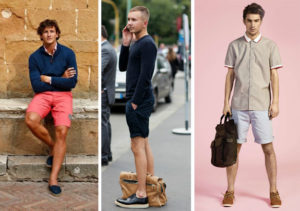 A European woman will always wear a dress suitable for the event at a social event or other official appearance. Even if in 99% of cases she goes out into the city in faded jeans and an elongated sweater. As for the desire to stand out in front of others, it is sometimes also not alien to the inhabitants of the West. But standing out here is accepted at a higher level than everyday clothing. For example, a sign of a person’s wealth here is a country house, a respectable car or yacht, or children studying at a prestigious university.
A European woman will always wear a dress suitable for the event at a social event or other official appearance. Even if in 99% of cases she goes out into the city in faded jeans and an elongated sweater. As for the desire to stand out in front of others, it is sometimes also not alien to the inhabitants of the West. But standing out here is accepted at a higher level than everyday clothing. For example, a sign of a person’s wealth here is a country house, a respectable car or yacht, or children studying at a prestigious university.
What about the Russians?
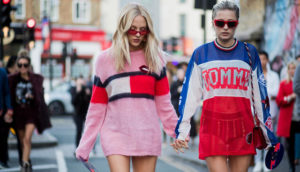 Our compatriots and, to an even greater extent, compatriots are much more scrupulous about the choice of clothes for going to the store, on a visit, or just for a walk. The main principle here is not to lose face in front of neighbors or acquaintances, to show everyone that we are not born with bastards.. As one humorist said about this: “Even if the food at home is only pasta, but you have Prada on your feet.”Such extroversion is even more precisely defined by a proverb born in the dashing 90s: “Post is more valuable than money!”
Our compatriots and, to an even greater extent, compatriots are much more scrupulous about the choice of clothes for going to the store, on a visit, or just for a walk. The main principle here is not to lose face in front of neighbors or acquaintances, to show everyone that we are not born with bastards.. As one humorist said about this: “Even if the food at home is only pasta, but you have Prada on your feet.”Such extroversion is even more precisely defined by a proverb born in the dashing 90s: “Post is more valuable than money!”
 Many stylists see the basis of the desire to stand out in front of others as a purely psychological complex generated by the general “equalization” of Soviet times. A total shortage of everything, including beautiful, high-quality clothing, forced Soviet citizens to get imported jeans, jumpers, blouses, and tights by hook or by crook. Such things served as a real source of pride for their owners and the black envy of those who did not have them.
Many stylists see the basis of the desire to stand out in front of others as a purely psychological complex generated by the general “equalization” of Soviet times. A total shortage of everything, including beautiful, high-quality clothing, forced Soviet citizens to get imported jeans, jumpers, blouses, and tights by hook or by crook. Such things served as a real source of pride for their owners and the black envy of those who did not have them.
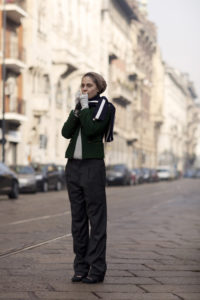 Then the era of the free market arrived, and a real sea of inexpensive consumer goods from all over the world poured into the country, primarily from China and Turkey. This is where our compatriots, who have “emerged” from the standard school uniform, got the opportunity to recoup the years of universal equality. Where else could an ordinary Russian show off his “made in China” outfits at that time? Yes, only on the street, in a store or visiting friends.
Then the era of the free market arrived, and a real sea of inexpensive consumer goods from all over the world poured into the country, primarily from China and Turkey. This is where our compatriots, who have “emerged” from the standard school uniform, got the opportunity to recoup the years of universal equality. Where else could an ordinary Russian show off his “made in China” outfits at that time? Yes, only on the street, in a store or visiting friends.
According to fashion historians, the modern attitude of Russians towards clothes for everyday wear is an echo of that turbulent transitional era. And, perhaps, over time, this desire will certainly, appropriately and inappropriately, to show off your outfits, will sink into oblivion, giving way to European practicality. But one should not be too harsh about the desire of Russians to always look “at 100.” Many people, even abroad, believe that such a caring attitude towards our own appearance distinguishes us favorably from Europeans and Americans.


 1
1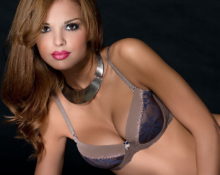
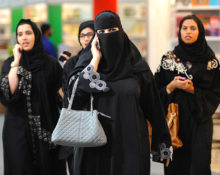


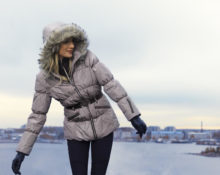


you wrote nonsense... ordinary myths that justify sloppy and unwashed European women... I’ve been living in Europe for 11 years, the stores are full of normal clothes, there are plenty of catalogs with clothes and they are very cute, a lot of everyday dresses, bright, beautiful, fashionable... I order them myself... but as soon as dress like a person... not flashy, and not in terrible worn out jeans and a stretched out t-shirt... such looks... and also the way you described the local lumpen dresses... a little bit of an intellectual... a completely different situation... and don’t talk about high heels... who already wears them walks around...nobody...some kind of chaotic article by a person who has never lived in Europe and has never even been to it...or saw it from a car window...
“Non-interference in the life of a neighbor” did you know that in Germany they look at their neighbors’ refrigerator through binoculars, and if they suddenly see something that, in the neighbor’s opinion, should not be there, everyone wait for the inspectors, where from? And the neighbor who bought a Merc, and you are still driving a Nissan, the queue to see a psychotherapist is scheduled for a year in advance, and yes, non-interference, amused
All cliches about us, Russians! Brrrrr...how unpleasant...
Here is a headline from the British newspaper The Telegraph, material taken from the Internet -
“Slob nation: the British used to be stylish, but now we’re a bunch of scruffs.” Anyone who knows a little English will translate it themselves. My translation is “A nation of sluts. The British had an elegant style, but now we are a dirty herd.” There are similar articles in the American press. Sloppiness and untidiness in clothing is a worldwide trend.
You would have already decided that where there is a lot of sausage, or they are stylishly dressed there or in Russia, that they are shaved, that the Germans are wearing what they woke up in the morning, they went to the store in that, it’s good if they combed their hair, they are shaved - the bed linen is changed every six months, you praise them, assholes and dirty tricks, migrants, now citizens, can recover in the middle of the street, they hate and despise the locals to such an extent